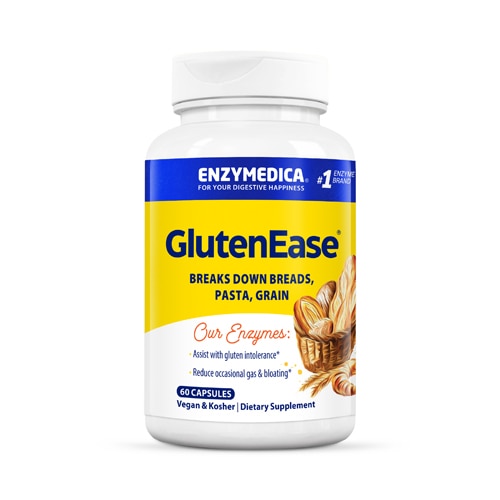Eating should be a joyful experience, but sometimes a certain food (or foods) can cause stress and discomfort. Identifying your
food intolerances can reunite you with favorite foods – and help you find new ones. Keep reading to learn about some of the most common food intolerances and how
digestive enzyme supplements might help, plus tips for navigating both cooking and dining out.

A food intolerance is a gastrointestinal response to food, while an allergy is an immune response. Intolerances can be caused by components of a food, enzyme deficiencies, problems with GI transit or issues with the physical side of digestion.
Common food intolerances include complex carbohydrates, milk sugar (lactose), milk protein (casein), gluten, phenols and
FODMAPS (fermentable oligo-, di-, mono-saccharides and polyols). The severity of food intolerances ranges from disrupting everyday life to relegating foods to special occasions.
Food intolerances impact your body’s ability to digest or break down certain foods or nutrients. Symptoms may happen hours later and include:
- occasional gas
- bloating
- cramps
- occasional heartburn
- diarrhea
- indigestion
- other digestive issues
6 of the most common food intolerances
The list of the most common
food allergens and food intolerances have some overlap, but there is a difference.
Affecting up to 2 in 10 Americans, food intolerances include:
FODMAPS: When not digested in the lower GI tract, these carbs force water into the digestive tract, leading to discomfort. High-FODMAP foods include: onions and garlic, wheat, rye, legumes, artichokes, dairy, fruits, honey, agave, mushrooms and snow peas.
Dairy sugar and dairy protein: Beyond lactose (dairy sugar) intolerance, some people can have issues breaking down casein (proteins found in dairy). Enzymedica’s
Lacto™ contains powerful enzymes to breaks down lactose (dairy sugar), casein (dairy protein), and dairy fats for complete meal digestion.†
Wheat:
Gluten is the main protein in wheat, rye and barley. A sensitivity to wheat could be restricted to gluten or include other proteins gliadin and glutenin. Sometimes people are intolerant to aspects of wheat itself, while others are
intolerance to gluten. (A gluten or wheat intolerance is not the same as celiac disease.) Enzymedica’s
GlutenEase™ breaks down bread, pasta and grains with powerful gluten intolerance enzymes (and it also breaks down casein).†
Phenols: These antioxidant nutrients found in some plants are essential for health, but some individuals are sensitive to them.
Fructose: a simple sugar found in fruit, some vegetables, honey, agave and other sweeteners, to which some people are sensitive.
The fiber in raw vegetables as well as other complex carbohydrates in foods like beans can cause digestive discomforts. Dietary fat or proteins can also cause digestive woes. No matter what your food sensitivity might be, you have options! Enzymedica’s
Digest Spectrum™ delivers enzymes for multiple food intolerances, to break down gluten, phenols, lactose and casein.†
To completely digest food and assimilate essential nutrients, the body needs sufficient supplies of digestive enzymes. Digestive enzyme supplements offer support when there’s a shortage. Supplementing with digestive enzymes helps counteract incomplete digestion – and prevent the symptoms associated with enzyme insufficiency.
When choosing enzymes, look for products that measure enzymes by activity levels, using unique standards for each type, per the internationally recognized Food Chemical Codex standards for purity, quality and identity of food ingredients.
7 ways to avoid foods that give you trouble
Here are six ways you can avoid foods containing problematic ingredients and learn to find foods that will love you back.
- Read labels. The most common allergens are called out in bold type, so if your intolerance is one of those, it will be easier to find. Read through each ingredient carefully. Some ingredients go by more than one name.
- Choose products labeled gluten-free, dairy-free, soy-free, corn-free, egg-free and peanut-free. These products are often made in a facility that avoids cross-contamination, which reduces your risks. And they call out any potential contaminants to help you make informed decisions.
- Cook at home more often. A harmless “secret ingredient” or spice blend can trigger a food sensitivity while dining out. Cooking for yourself ensures you avoid triggers.
- Ask about menus and cooking methods. Call ahead, browse menus online and consider bringing a list of your trigger foods. More restaurants cater to different dietary preferences, so do some online sleuthing to find some near you.
- Don’t do it alone. Having people who “get it” can be a big help. Look for groups related to your food intolerances on Facebook, search related hashtags on Instagram and follow TikTokers who are in the same boat, so to speak.
- Shop at Vitacost. From cauliflower flour and grain-free tortilla chips to cashew queso and lupine yogurt, it is possible to replace just about every food with a different version if you have an intolerance.
- Be prepared. Carry a snack with you in case hunger hits unexpectedly – and keep your go-to enzymes close at hand. They can offer support at home and on the go.
Think you may have a food intolerance?
- Track your symptoms to connect the dots between what you eat and how you feel after. It can also be a useful tool for your health-care provider.
- Take an elimination diet This removes foods most likely to trigger intolerances for a set amount of time. They are added back carefully, to monitor any reaction.
- See your health-care provider for testing, which can determine if a certain food or ingredient is causing your symptoms.
- Be patient – and go easy on yourself. It can take time to figure out what is happening and which foods are causing you occasional woes.
Start by talking to your health-care provider. With a few simple steps, you can begin to identify which foods may be troublesome and learn how to cope!
†These statements have not been approved by the Food and Drug Administration. These products are not intended to diagnose, treat, cure or prevent disease.
 A food intolerance is a gastrointestinal response to food, while an allergy is an immune response. Intolerances can be caused by components of a food, enzyme deficiencies, problems with GI transit or issues with the physical side of digestion.
Common food intolerances include complex carbohydrates, milk sugar (lactose), milk protein (casein), gluten, phenols and FODMAPS (fermentable oligo-, di-, mono-saccharides and polyols). The severity of food intolerances ranges from disrupting everyday life to relegating foods to special occasions.
Food intolerances impact your body’s ability to digest or break down certain foods or nutrients. Symptoms may happen hours later and include:
A food intolerance is a gastrointestinal response to food, while an allergy is an immune response. Intolerances can be caused by components of a food, enzyme deficiencies, problems with GI transit or issues with the physical side of digestion.
Common food intolerances include complex carbohydrates, milk sugar (lactose), milk protein (casein), gluten, phenols and FODMAPS (fermentable oligo-, di-, mono-saccharides and polyols). The severity of food intolerances ranges from disrupting everyday life to relegating foods to special occasions.
Food intolerances impact your body’s ability to digest or break down certain foods or nutrients. Symptoms may happen hours later and include:



